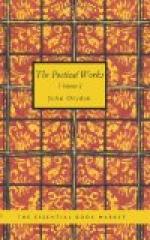Without a vision poets can foreshow
What all but fools by common sense may
know:
If true succession from our isle should
fail,
And crowds profane with impious arms prevail,
290
Not thou, nor those thy factious arts
engage,
Shall reap that harvest of rebellious
rage,
With which thou flatterest thy decrepit
age.
The swelling poison of the several sects,
Which, wanting vent, the nation’s
health infects,
Shall burst its bag; and, fighting out
their way,
The various venoms on each other prey.
The presbyter, puff’d up with spiritual
pride,
Shall on the necks of the lewd nobles
ride:
His brethren damn, the civil power defy;
300
And parcel out republic prelacy.
But short shall be his reign: his
rigid yoke
And tyrant power will puny sects provoke;
And frogs and toads, and all the tadpole
train,
Will croak to heaven for help, from this
devouring crane.
The cut-throat sword and clamorous gown
shall jar,
In sharing their ill-gotten spoils of
war:
Chiefs shall be grudged the part which
they pretend;
Lords envy lords, and friends with every
friend
About their impious merit shall contend.
310
The surly commons shall respect deny,
And justle peerage out with property.
Their general either shall his trust betray,
And force the crowd to arbitrary sway;
Or they, suspecting his ambitious aim,
In hate of kings shall cast anew the frame;
And thrust out Collatine that bore their
name.
Thus inborn broils the factions
would engage,
Or wars of exiled heirs, or foreign rage,
Till halting vengeance overtook our age:
320
And our wild labours, wearied into rest,
Reclined us on a rightful monarch’s
breast.
—“Pudet
haec opprobria, vobis
Et dici potuisse, et non potuisse refelli.”
* * * * *
FOOTNOTES:
[Footnote 76: ‘The Medal:’ see ‘Life.’]
[Footnote 77: A pamphlet vindicating Lord Shaftesbury from being concerned in any plotting designs against the King. Wood says, the general report was, that it was written by the earl himself.]
[Footnote 78: When England, in the sixteenth century, was supposed in danger from the designs of Spain, the principal people, with the queen at their head, entered into an association for the defence of their country, and of the Protestant religion, against Popery, invasion, and innovation.]
[Footnote 79: ‘Brother:’ George Cooper, Esq., brother to the Earl of Shaftesbury, was married to a daughter of Alderman Oldfield; and, being settled in the city, became a great man among the Whigs and fanatics.]
[Footnote 80: ‘Polish:’ Shaftesbury was said to have entertained hopes of the crown of Poland.]




